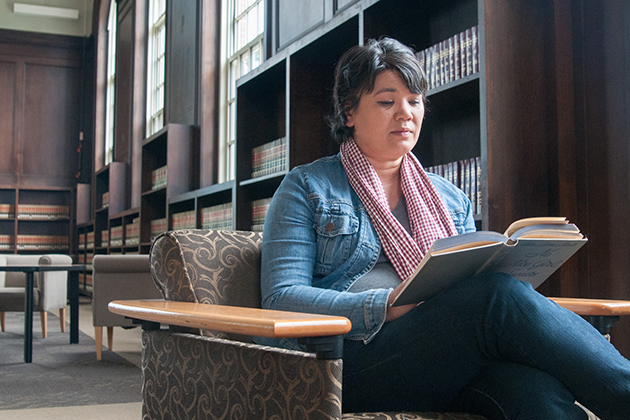(University of Texas at Austin)
to Speaking to Power Conference 2020!
Keynote : The Relevance and Resonance of Audre Lorde's Demolition Project
Dr. Schlund-Vials is a Cambodian American scholar whose work is rooted in a personal history marked by immigration, migration and diaspora. Her academic projects examine moments of dislocation, rupture, and movement that engender crucial connections between history, memory, citizenship, civil rights and human rights.
Her current body of work (comprised of past and present projects) and my future research plans reflect “global” migrations between the fields of critical Asian and comparative Asia American studies. As an internationalist bridge, she consistently analyzes the possibilities, limitations, and contradictions at the forefront of civil rights, human rights, and state-authorized humanitarianism. In so doing, she takes seriously the turn in Asian studies towards diaspora, particularly with regard to Southeast Asia. She likewise engages a related shift within Asian American studies, wherein the purview of the field has expanded to accommodate movements not only between nation-state borders but also across oceans, continents, and hemispheres.
Her first monograph, Modeling Citizenship: Jewish and Asian American Writing (Temple University Press 2011), considered the role of immigration policy and naturalization law in the making of two so-termed “model minorities”: Jewish Americans and Asian Americans. Modeling Citizenship consistently deconstructs the ways in which both groups attempted – via literary production – to negotiate the vexed terrain of U.S. citizenship by accessing notions of belonging that traverse both countries of origin and nations of settlement. A comparative ethnic studies project, Modeling Citizenship tactically accessed the structure and grammar of naturalization (wherein a subject gains U.S. citizenship through the renunciation of past foreign affiliations) as a means of mapping the transnational contours of Jewish and Asian American writing. In particular, Modeling Citizenship focused on the works of Edith Maude Eaton, Abraham Cahan, Israel Zangwill C.Y. Lee, Bharati Mukherjee, and Eva Hoffman.
Whereas Modeling Citizenship concentrated on immigrant bodies, her second monograph – War, Genocide, and Justice: Cambodian American Memory Work (University of Minnesota 2012) – accentuated refugee subjectivity, international law, and human rights, particularly with regard to the so-termed “Killing Fields era” (1975-1979). In the three years, eight months, and twenty days of the Khmer Rouge’s deadly reign over Cambodia, an estimated 1.7 million Cambodians (21-25% of the extant population) perished due to forced labor, execution, starvation, and disease. Despite the passage of more than thirty-five years, two regime shifts, and a contested U.N. intervention, only three former Khmer Rouge officials have been successfully tried and sentenced for crimes against humanity in an international court of law (in 2010 and 2014). It is against this backdrop of war, genocide, and denied justice that she explores, evaluates, and analyzes the work of 1.5-generation Cambodian American artists and writers. Drawing on what James Young provocatively labels “memory work” to consider the collected and debated articulation of large-scale human loss, War, Genocide, and Justice considers the multivalent ways in which such artists potently reimagine alternative sites for memorialization, reclamation, and justice. The project necessarily situates parallel but not identical “forgetting politics” in Cambodia and in the United States as a foundation to render visible politicized acts of resistance that are individually produced, communally consumed, and globally relevant.
These intellectual investments in comparative ethnic studies, Asian American studies, and Southeast Asian American studies foreground the types of scholarly inquiries embedded in her present and future projects, which include articles, book chapters, a series of co-edited collections (published, forthcoming, and in-progress) and two single-authored monographs (in-progress).

